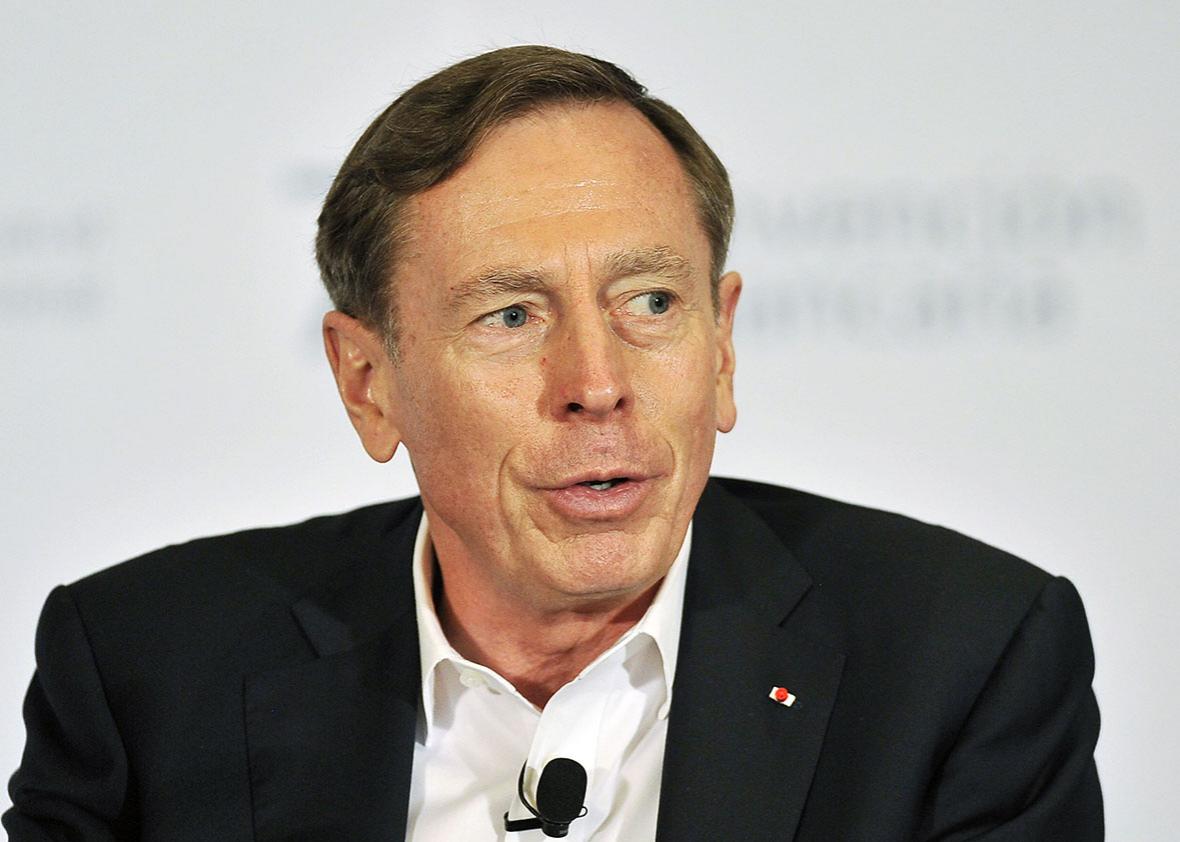David Petraeus is back.
The former commander of Iraq and Afghanistan and most celebrated general of our times, forced by a sex scandal to resign his post-Army dream job of CIA director, shamed into retreat from political life, and criminally prosecuted for giving his mistress-biographer classified information—despite this harrowing path of self-destruction, he is now, 3½ years later, a public figure once more, speaking out on the issues of the day to generally respectful audiences.
And some of the things he’s saying are raising eyebrows. To a packed hall at New America’s New York headquarters Monday night, Petraeus endorsed tighter restrictions on gun sales, including the “no-fly, no-buy rule,” under which anyone on an FBI watch list would be barred from purchasing firearms.
At the same forum, he decried Donald Trump’s anti-Muslim rhetoric (without uttering the Republican candidate’s name), noting that wherever we’ve met progress in the Middle East, there’s been “a Muslim partner.”
He expressed opposition to torture, saying, from his experience overseeing some of the world’s largest detention centers, that the best way for an interrogator to extract information from a detainee is “to become his best friend.”
And though Petraeus criticized some of President Obama’s policies on Iraq and Syria, he praised the actions taken lately, saying that ISIS forces on the ground are “close to collapse” and that “the odds are,” their strongholds will be cleared by the end of Obama’s term in office.
In short, and to the disturbance of some conservatives who might have thought he was on their side, Petraeus has been sounding a lot like a Democrat.
Most of his positions on these issues are hardly new. When the film Zero Dark Thirty was released in December 2012, some of Petraeus’ friends encouraged him to speak out against its claim that information gleaned through torture led the way to finding Osama Bin Laden—a thesis he knew to be untrue. But Petraeus’ scandal was still fresh (he’d been forced out of the CIA just a month earlier), and he spent his days, for the next several months, holed up inside his Virginia home, pedaling his exercise bike, reading, talking with friends on the phone—anything to avoid the flock of reporters and cameras perched just beyond his front yard. His lawyer, Robert Barnett, advised him to keep a low profile; and Petraeus, who referred to Barnett as his “consigliere,” obeyed his every instruction.
Those days, apparently, are over. Not long into this exile of sorts, the financier Henry Kravis created a think tank for Petraeus to run. Two years later, he made Petraeus a partner of his firm, Kohlberg, Kravis, Roberts, widely known as KKR. By then, Petraeus had started speaking a bit in public forums, sometimes making (as he told one friend in a tone of disbelief) more in one speech than he’d earned all year as a wartime four-star general.
In the past several months, his appearances have grown more frequent: op-eds in the Washington Post and the Wall Street Journal, a profile in the Financial Times, interviews at the Council on Foreign Relations, the 92nd Street Y, Charlie Rose, and—on Monday—New America.
He’s grown more confident in his speaking style, slicker at evading things he doesn’t want to talk about. At the New America event, he spoke with uncharacteristic passion about the large number of gunshot deaths every year in America and the inexcusable lack of regulations, which, among other things, compounds the threat of domestic terrorism.
During the Q&A period, I asked him whether he’d be willing to take a more activist stance on this issue, writing articles, testifying before Congress, appearing on TV commercials, campaigning for political candidates. He said he wasn’t sure. He cited his many other commitments: his position at KKR, his board memberships, teaching positions, speaking gigs, occasional pro bono work—the list went on for nearly a minute—even citing “complications,” such as interpretations of the Second Amendment, with which he said he’d need to become more familiar.
In short, to cite the title of Paula Broadwell’s biography that got him into so much trouble, Petraeus is not yet quite willing to go All In when it comes to partisan political activism. His reluctance may have many sources: corporate conflicts with KKR, the natural tendency of modern military officers to stay away from political controversy, or maybe his own shrewd tendency to keep all options open.
Petraeus has long insisted that, rumors notwithstanding, he has no interest in running for president. When reporters asked him the question more than once, he would often reply, “What part of ‘No’ do you not understand?” He was equally adamant in private. When he was advising President Obama, both as a military commander and as CIA director, he offered these assurances many times to White House staffers who viewed Petraeus as a possible political threat (especially since his closest political friends were Republicans).
Of course, all this talk predated the scandal. If he ever harbored visions of a run for the White House, or—more likely—if politicians ever dreamed of offering him either half of a presidential ticket, those notions now lie in the realm of fantasy.
However, a close associate of Petraeus’ says that, though he recognizes the damage the retired general inflicted on his prospects, he does “not rule out the possibility of further government service.” He still pines for that life, and what we might be seeing, in these op-eds, speeches, and interviews, is an audition for the ultimate rehabilitation.
